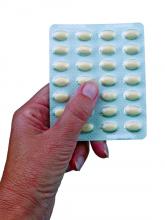, and may also be linked to lower all-cause mortality, according to data presented in a poster at the annual meeting of the American College of Cardiology.
In a retrospective cohort study involving 4,286 consecutive asymptomatic postmenopausal women undergoing coronary artery calcium scanning between 1998 and 2012, researchers sought to clarify the controversial cardioprotective effects of hormone replacement therapy (HT).
The average coronary artery calcium score was significantly lower in the 41% of women who were taking HT compared to those who weren’t (72.1 ± 223 vs. 3,119.2 plus or minus 322.2; P less than .001). This difference remained significant for each 5-year age group, reported Yoav Arnson, MD, of Cedars-Sinai Medical Center in Los Angeles, and coauthors.After adjustment for age and cardiac risk factors, HT was associated with a higher prevalence of women with calcium artery score of 0, and a lower prevalence of women with calcium artery scores above 399.
Women taking HT also had significantly lower mortality compared with those not on HT (5.8% vs. 6.8%). After adjustment for age, cardiac risk factors, and coronary artery calcium scores, women on HT had a 30% lower long-term mortality (95% confidence interval, 0.49-0.98; P = .043).
“Hormone replacement therapy resulted in lower atherosclerosis and improved survival for all age groups and for all levels of coronary calcium,” Dr. Arnson said in a statement. “From this we do think it is beneficial, but we would need prospective or randomized studies to determine which groups might not benefit or even be harmed by this therapy.”
The women in the HT group were significantly younger than those not taking HT, and had a lower prevalence of hypertension and diabetes as well as higher average HDL cholesterol than women not taking HT.
Researchers saw a clear decrease in the number of women taking HT over the course of the study, declining from a peak of 60% in 1998 to 23% of women in 2012.
No disclosures were available.


